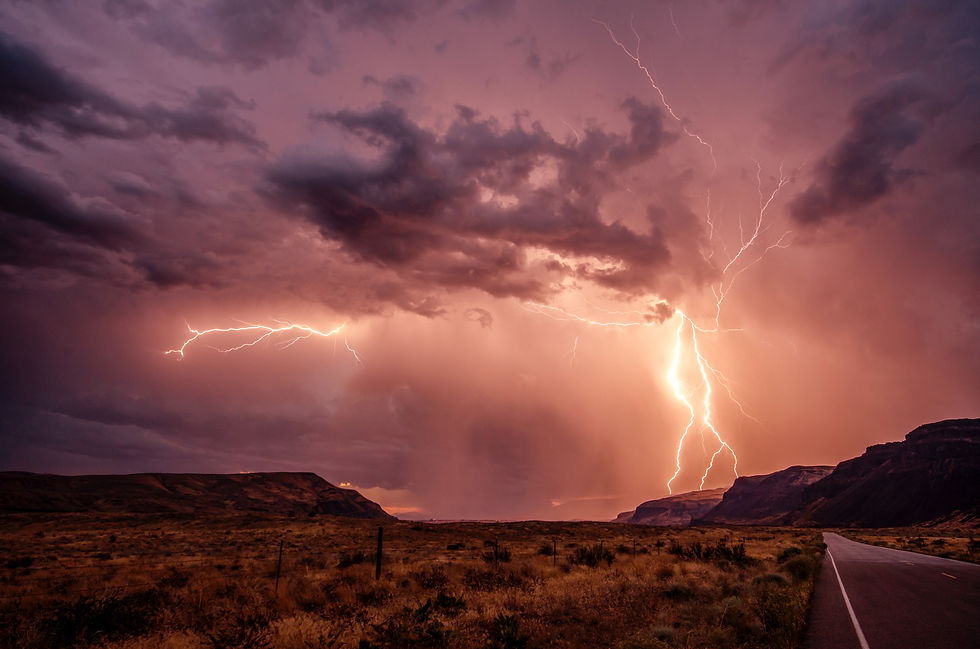From Vulnerability to Victory: Understanding Your Personality and Rejection Sensitivity
- Dr. Michael Gamble

- Sep 22, 2023
- 11 min read

Welcome back, dear reader, to the final chapter of our series on rejection sensitivity, where we've been navigating the treacherous waters of social anxiety, cognitive biases, and the unmasked self. If you've missed the earlier installments, fear not; you're just in time to embark on the last leg of our journey.
In our previous adventures, we've peeled back the layers of rejection sensitivity's impact on our lives, exposing the intricate dance it shares with social anxiety. We've uncovered the cognitive biases, negative self-images, and avoidance behaviors that often accompany these conditions. Now, as we set sail on this final expedition, we'll explore how rejection sensitivity manifests differently in introverts, extroverts, and empaths.
But that's not all; we'll also dive deep into the healing waters of self-care and the importance of hope. As we delve into these concepts, we'll equip you with the tools you need to navigate the intricate terrain of rejection sensitivity.
So, grab your life jacket and brace yourself for the last leg of our journey. We're about to explore how rejection sensitivity affects different personality types and delve into the importance of self-care and hope in navigating these tumultuous waters. Your adventure begins here.
Let's dive in!
Ah, introverts and extroverts, the yin and yang of the social world. Let's shine a spotlight on how rejection sensitivity weaves its intricate threads into their social social fabric. So let's first explore the minds of introverts those fascinating creatures of the inner social world.
These masters of introspection, may find themselves walking a tightrope when dealing with rejection sensitivity. The fear of rejection often leads them to err on the side of caution, preferring solitude over social gatherings. Why? Because the prospect of social rejection can feel like navigating a minefield, causing their internal alarms to ring loudly.
Introverts, renowned for their reflective nature, might find themselves facing a unique challenge. The fear of rejection can send their inner world into a whirlwind of doubts and insecurities. What if people don't like me? What if I say something embarrassing? These questions can become the soundtrack of their social interactions.

Research suggests that introverts may be more prone to avoidance behaviors due to rejection sensitivity. They might opt for the safety of solitude rather than risk navigating the minefield of potential rejections in social gatherings. It's not that they don't want social connections; it's that the fear of rejection can sometimes feel paralyzing.
One key aspect to understand is that introverts aren't necessarily averse to social connections; they value them deeply. What distinguishes introverts is their unique way of processing social interactions. These individuals often engage in a post-socialization analysis, replaying conversations and scrutinizing their own behavior. This self-reflection can be an asset, allowing them to form deeper connections. However, when rejection sensitivity takes the wheel, it can turn this process into a relentless cycle of self-doubt.
In social situations, introverts may tread cautiously, approaching interactions with a thoughtful demeanor. But beneath this composed exterior, they're navigating the treacherous waters of self-criticism. The fear of rejection can sometimes feel paralyzing, leading them to opt for solitude rather than risk facing potential rejections.
The intricate dance between introversion and rejection sensitivity illustrates that even those who thrive in solitude can be profoundly affected by their social encounters. The fear of rejection doesn't discriminate based on personality; it has a way of infiltrating the minds of introverts and extroverts alike.
Introverts' Deep Inner Worlds:

Introverts often have rich inner worlds and a strong sense of self. This self-awareness can influence how they interpret rejection, as they may take it as a reflection of their core identity, and often find themselves immersed in deep self-reflection, frequently contemplating their thoughts and actions.
When confronted with the fear of social judgment, this self-reflection becomes even more intense. Consequently, they become hyper-aware of their behavior, meticulously dissecting past social interactions in search of any signs of potential rejection. Their heightened sensitivity to feedback, including nonverbal cues and tone of voice, can lead them to overanalyze these cues, often interpreting neutral or ambiguous signals as indications of rejection, even when this may not be the case.
Furthermore, introverts share a common concern about making social missteps or uttering the wrong words in social settings. This fear can be paralyzing, as they make significant efforts to avoid any behavior that might lead to rejection. This constant self-monitoring fosters anxiety and stress during social encounters.
Additionally, anticipatory anxiety is a frequent companion, as introverts mentally rehearse social scenarios, envisioning all the possible ways they might be judged or rejected. This anxiety can become overwhelming, hindering their ability to approach social situations with confidence.
Moreover, introverts often grapple with the reluctance to divulge their fears and insecurities, fearing that exposing vulnerability could lead to rejection.
This inclination results in them internalizing their struggles with rejection sensitivity, making it challenging to seek support or validation from others. They may also become more
selective about social engagements and interactions, favoring smaller, more intimate gatherings where they feel less exposed to potential rejection. Lastly, their propensity for setting high standards for themselves can translate into perfectionism during social interactions, where they feel compelled to present themselves flawlessly. Any perceived imperfection can cause significant distress.
In summary, introverts' fear of social judgment intensifies their sensitivity to rejection. Their inclination to overanalyze, their acute awareness of social cues, and their anticipatory anxiety all contribute to a complex interplay between introversion and rejection sensitivity. Understanding these dynamics can empower introverts to develop strategies for navigating social situations with increased confidence and reduced fear of judgment.
When Extroverts Face the Rejection Sensitivity Showdown
Ok! the extroverts, those social butterflies who make the world their playground! But guess what? Even these lively souls aren't immune to the peculiar beast known as rejection sensitivity. In their own exuberant way, they wade through the murky waters of perceived rejection, and let's be honest, it can get quite entertaining.
Picture this: an extrovert, fueled by their love for social interaction, boldly ventures into the world of relationships. They're like the life of the party, right? But here's the twist – their very extroversion can amplify their reactions to rejection, making it more of a rollercoaster ride than a casual stroll.
Extroverts, often characterized by their outgoing and sociable nature, can still be significantly affected by rejection sensitivity, albeit in distinct ways. While they thrive on social interactions and often seek out new connections, their extroverted tendencies can magnify their reactions to perceived rejection.
Extroverts tend to derive their energy from social interactions, and as a result, they invest heavily in relationships. They are inclined to form connections quickly and deeply, making them more susceptible to the emotional impact of rejection. Consequently, when they encounter situations that evoke feelings of rejection, the emotional toll can be profound.
One fun element in this extravaganza is their hypersensitivity to negative feedback. These folks are often the life of the conversation, the soul of the gathering, but that also means they're quick to react to any critique. A single, solitary critique or a seemingly indifferent gesture can send them on a melodramatic whirlwind of self-doubt and melodrama.
Now, let's talk about the sheer volume of social interactions extroverts tend to engage in. It's like they're collecting social experiences like Pokémon, but little do they know, it increases the odds of running into rejection situations. It's almost as if they're playing a never-ending game of social roulette. And when they do encounter a rejection scenario, it's akin to a confetti cannon of emotions going off.
Extroverts' inclination to surround themselves with people can sometimes result in a strong fear of social isolation. They value their connections deeply and often rely on them for emotional support. Any signs of rejection, such as exclusion from social plans or a perceived withdrawal of affection, can trigger intense feelings of abandonment and loneliness.
Furthermore, extroverts may find it challenging to conceal their feelings, making their reactions to rejection more visible to others. This visibility can lead to a cycle of self-criticism and embarrassment, as they fear that their emotional responses may alienate them further. They may even question their extroverted nature, wondering if their openness is driving others away.
Empathy, that wonderful quality associated with extroverts, plays a double role here. On one hand, it allows them to connect with others on a deep level, like a Jedi mind trick of emotions. But watch out, it can also turn them into emotional sponges. They might sense an ounce of tension in the room and instantly blame themselves, even if it's completely unrelated. It's like they have a PhD in overanalyzing social cues.
Now, we arrive at the grand spectacle – extroverts' fear of social isolation. They collect friends like trading cards, and heaven forbid they're left out of social plans or detect a drop in affection. It's a genuine nightmare scenario for them. Imagine their distress levels skyrocketing as they grapple with thoughts of abandonment and envision a life in solitude, equipped only with Netflix and a giant tub of ice cream.
To make things even more entertaining, extroverts are often not very skilled at concealing their emotions. Their reactions to rejection are as transparent as a freshly cleaned window. This visibility can lead to a delightful cycle of self-criticism and embarrassment, as they ponder if their emotional displays are driving others away. They might even contemplate changing their extroverted ways.
So there you have it, the world of extroverts navigating rejection sensitivity with all the charisma and flair you'd expect. It's a rollercoaster ride filled with heightened sensitivities, a never-ending social calendar, empathetic adventures, isolation fears, and some truly animated emotional displays. Who said rejection sensitivity can't be a riveting spectacle?
The Empath's Emotional Rollercoaster: When Rejection Sensitivity Takes the Front Seat

Ah, empaths, the emotional sponges of the world. These folks have an uncanny ability to soak up feelings from their surroundings. But you might be tempted to think, "Empaths, rejection sensitivity? Nah, they're immune, right?" Well, not so fast. Even these emotional ninjas have their kryptonite, and it goes by the name of rejection sensitivity.
Empaths, the emotional radar operators of the social world, can pinpoint feelings in others with frightening accuracy. But what happens when they sense a hint of negativity or discomfort in the room? Brace yourselves; it's a rollercoaster of emotions. Instead of shrugging it off, they often internalize it, carrying the weight of the world on their empathic shoulders. If there's guilt in the air, you can bet an empath will find a way to inhale it.
Now, here's where it gets interesting. Empaths are the caregivers, the healers, the emotional first responders. They're the ones who'll offer you a comforting shoulder when you're down. But, and it's a big but, they often forget that they need a little TLC too. Their empathy flows like a river toward others, leaving a drought in the self-care department. And guess what? This drought can turn their rejection sensitivity into a full-blown desert storm.

Imagine our empathic hero in a social gathering, their emotional radar set to maximum sensitivity. They can pick up on emotional shifts like a hawk spotting a mouse from miles away. But here's the twist: if there's a whiff of discord, if someone's feeling off, guess who'll take it personally? You got it, our empath. They're like emotional vacuum cleaners, sucking up all the negativity and then dwelling on it like they just stumbled upon the Holy Grail of self-doubt.
Now, empaths may have an innate gift for understanding others' feelings, but it's a double-edged sword when it comes to rejection sensitivity. Every word, every glance, every subtle cue gets analyzed, dissected, and held up to the light like evidence in a murder mystery. Did they mean that? Was it a slight? Did they just drop a rejection bomb on me? Cue hours of self-doubt and overthinking.
Empaths are the ultimate people-pleasers. They'll go to Herculean lengths to ensure everyone's comfort and happiness. But here's the rub: their desire to please can lead to self-neglect, boundary-breaking, and an expert-level skill in suppressing their own emotions. So, when a whiff of rejection appears, it's like a cruel twist in their pursuit of maintaining harmony. Cue the self-sacrificing empath.
When empaths sense rejection on the horizon, they might pull a vanishing act. It's not magic; it's just their way of avoiding the discomfort of uncertainty. They'd rather endure the isolation than face the dreaded possibility of rejection. But, spoiler alert, this withdrawal strategy usually cranks up their rejection sensitivity a few notches.
So, there you have it, our empathic friends, feeling all the feels, internalizing everything, neglecting their self-care, overthinking like pros, striving to please, and deploying avoidance tactics when the rejection monster rears its ugly head. It's a whirlwind of emotions, like a soap opera script written by Shakespeare himself, where rejection sensitivity takes center stage.
Self-Care Strategies for Reject-o-Meters (aka Everyone)
Now that we've dived into how rejection sensitivity affects different personality types, it's time for some universal self-care strategies that can work wonders for everyone dealing with this emotional rollercoaster.
1. Monitor Your Self-Talk
Start by being your own cheerleader instead of your harshest critic. Challenge those negative thoughts that lead to rejection sensitivity with self-affirming ones.
2. Embrace Rejection as Learning
Turn rejection into your personal growth mentor. Understand that every setback is a chance to learn, adapt, and emerge stronger.
3. Foster Resilience
Resilience is like emotional armor. Build it through mindfulness, meditation, or practices like yoga. It's your shield against the arrows of rejection.
4. Develop Coping Strategies
Instead of avoidance, develop healthy coping mechanisms. Deep breathing, progressive muscle relaxation, or even a five-minute dance party can diffuse rejection's sting.
5. Lean on Your Support System
Don't be afraid to reach out to friends, family, or support groups. Sharing your experiences can help normalize your feelings and provide much-needed relief.
6. Professional Help
If rejection sensitivity is overwhelming your life, consider professional guidance. Therapists can provide specialized strategies to navigate this challenging terrain.
7. Celebrate Small Wins
Acknowledge and celebrate your achievements, no matter how small they seem. Positive reinforcement can be a rejection-resistant elixir.
Remember, everyone faces rejection at some point. It's how we respond to it that defines us. So, put on your rejection-resistant armor and keep marching forward.
In life's grand theater, rejection sensitivity may fancy itself as the lead actor, but armed with these insights, you can rewrite the script and take center stage, becoming the star of your own show. 🌟
The Importance of Hope for Navigating Rejection Sensitivity
Hope, the North Star guiding us through the labyrinth of rejection sensitivity, is no mere wishful thinking but a resilient lifebuoy in the tempest of emotions.

Why Hope Matters:
Imagine you're lost on a winding, fog-draped road with no GPS, map, or sense of direction. This aimless journey mirrors the experience of those wrestling with rejection sensitivity, where fear of rejection can lead to emotional paralysis.
Hope is your trusty GPS, recalibrating your route and reminding you that the destination, though obscured, is navigable. It assures you that rejections aren't dead ends but temporary detours on your path to personal growth and self-acceptance.
Hope as a Coping Mechanism:
Consider how hope functions as a coping mechanism. Those with rejection sensitivity cling to hope as they traverse social interactions. It's the whisper that says, "Perhaps this time, it'll be different." This hope isn't blind; it's a lifeline urging them to take daunting steps into social situations, despite their fear of rejection.
The Power of Connection:
Imagine hope as a bridge connecting individuals with rejection sensitivity to kindred souls who comprehend their journey. This connection isn't merely empathetic; it's an affirmation that they're not alone in their struggles. Through support groups, therapy, or heartfelt conversations with friends who've faced similar challenges, hope thrives in the shared experience of stories and strength.
Hope as a Motivator:
Visualize hope as a motivational coach, instilling courage in individuals to persevere despite setbacks. It propels them to seek therapy, practice self-care, and confront fresh challenges. Hope isn't a passive bystander; it's an active participant in their journey toward healing.
Hope as a Beacon of Resilience:
Think of hope as an emblem of resilience. It's the belief that even in the face of overwhelming rejection, individuals can bounce back stronger and more resilient than before. This resilience isn't just about enduring; it's about thriving.
A Lifelong Companion:
Emphasize that hope isn't a fleeting visitor; it's a lifelong companion. In the grand adventure of navigating rejection sensitivity, hope ensures the journey remains meaningful, even when the path is arduous.

Conclusion: The Lighthouse of Hope
In this grand trilogy on rejection sensitivity, we've delved deep into the human psyche, unraveling the mysteries that shroud this complex phenomenon. From understanding the underlying theories to exploring its impact on various personality types, we've shed light on the labyrinth of emotions.
Hope, the unassuming hero of our narrative, emerges as the guiding star, leading us out of the abyss of self-doubt. As we conclude this trilogy, remember that rejection sensitivity need not define you. With understanding, self-care, and an unwavering belief in the power of hope, you can navigate life's intricate social landscapes with resilience, growth, and self-acceptance as your companions. 🚀🌟
~ Michael Gamble



Comments